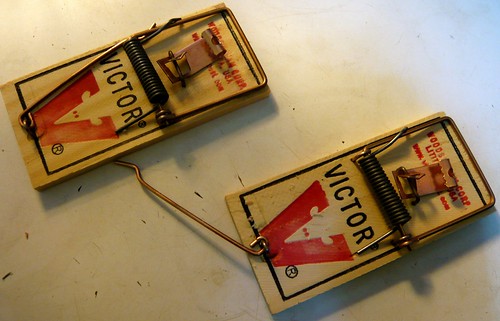
Ideas are what creative people in any profession are all about. We can’t help ourselves. We’re always observing and analyzing and coming up with new and better ways to do things. Sometimes all those ideas spin out into things that cross over from our primary careers or professions into things seemingly tangential. When that happens, we have a couple of options. We can shrug our shoulders and say “somebody really ought to do this sometime”. Maybe throw it out as a free idea on Twitter. File it and forget it. The other option is to do something about it. To turn it into a personal project.
The decision to seriously pursue an idea as a self-directed project isn’t an easy one. It’s natural enough to be excited by the possibilities of a new idea and to throw yourself into its pursuit. But that’s not seriously pursuing it. Believe me, I know. I’ve got folders full of started but unfinished personal projects. I’ve learned a lot from my many partial pursuits. The most important lesson is to respect anybody who’s ever created anything useful in a self-directed way. It’s hard work, mentally most of all. Your mind will fill with reasons why it will never work. If you share your idea, there will be others besides yourself coming up with ways your big idea is going to flop. It might fail, but I guarantee you’ll learn something from the process.
Here’s a few thoughts on considerations, risks and rewards based on my experience with personal projects:
Choice
Most creative people have more ideas for personal projects than they could ever possibly pursue. So how to decide which ones to pursue? A big part of it should be intuition and “gut”. I discard a lot of ideas as being either un-compelling or ridiculously complex and outside my competence. The ones I do pursue tend to be those that keep coming back to my mind again and again, unbidden. I think really worthwhile ideas assert themselves somehow, more choosing me than me choosing them. My own preference for personal projects is that they be just a little outside of what my day to day work is. I prefer to spend discretionary time on things that will push me to learn new skills that build on my existing strengths.
Time
Any new personal project added to your current commitments is going to take time. There’s no way around that. Yes, you’re on your own schedule, but at some point it would be great to complete the project. You do need to “make” time, but since that’s impossible, effectively it means deciding to give up doing something else. That could be anything from cutting back on watching TV and playing video games to deciding to get up an hour earlier every day. The trick is to identify and give up things that are not productive, and trade them for activities that are.
Commitment
It’s difficult to keep forward momentum on a project where the client is you. It’s probably different for everybody, but you need to find a way to ensure your project does not get stalled by distractions and conflicting priorities, whether your own or those of others. For the more organized among us, setting up a project schedule with milestones could be a good strategy. For others it might be the act of sharing the idea with a few supportive friends. Their occasional “hows it going?” enquiries could be enough to keep you moving forward. There should be some idea of an end point though. A project ceases to be a project and becomes more like a sentence if there’s no hint of an end.
Another test of commitment comes when it’s time to pony up some cash for prototypes or professional services. It’s one thing to spend time on your personal project, but spending money is when things start to get real. This point probably links back to the discussion about choice of project — if the project you’ve chosen to pursue requires a larger financial risk than you’re willing to take, perhaps it wasn’t the right project for you.
Pay-off
The purpose of many personal projects is revenue generation. It makes sense — money can be a powerful motivator. If that’s what will keep you focussed on your project, and maybe lead to a new revenue stream for you, go for it. I find most of my personal projects are more about the act of making something. It’s more about the challenge and learning from it, or less attractively, the currency of attention. Perhaps it’s a self-deceit, but I think that for every personal project I’ve ever spent time on, I learned something about myself and my abilities. Sometimes I learned I was really bad at doing something that others have found easy. Other times I’ve learned a lot about what I don’t know, by assuming it was easy. And once in a while, I’ve proven to myself that I could do something I thought might have been a bit out of reach.
Personal Projects are both tough and challenging, exhilarating and satisfying. They can keep you engaged and excited when some of your other work is less engrossing. And they can keep you humble when you get too cocky. So, what ideas are you working on?
photo credit: Flickr username: iamos
Like this? More from the Personal Projects category.
Follow me on Twitter (@intudes) for interesting links and occasional observations.
Subscribe to the RSS feed, and don’t miss another post.
Pingback: Personal Projects Ideas